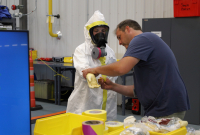Support strong Canadian climate journalism for 2025
Known by some as “the father of adaptation” to climate change, Ian Burton helped create and expand knowledge of this important concept for five decades in this country. Now, he is being recognized for his groundbreaking work, locally and nationally, with a 2023 Order of Canada appointment.
While proud of the award, Burton stressed the urgent need for more collaborative action. In an interview with Canada’s National Observer, he highlighted ongoing challenges, including the division of responsibilities between different levels of government. “There's always a tendency to push off to somebody else, and the need for money to go with it,” he said.
A professor emeritus at the University of Toronto’s geography department and School of the Environment, Burton emphasized that immediate solutions to halt climate change are challenging. “You have to learn to live with it and adapt to reduce its impact,” he explained.
Generally, climate adaptation is defined as any activity that reduces the negative impacts of climate change and may present new opportunities. Experts suggest adaptation measures can be diverse and vary across sectors globally. Some examples include coastal management, infrastructure improvements, nature-based solutions, insurance incentives and early warning systems. These measures not only mitigate the impacts of climate change but also offer opportunities for co-benefits with mitigation efforts.
From participating in the 1995 United Nations Conference of the Parties to crafting key climate change reports, Burton has long championed adaptation efforts.
Burton's interest in climate change traces back to his childhood living in his grandmother's house in Derbyshire, England, where floods were a common occurrence. His experiences with flooding sparked an interest that led him to study a wide range of natural hazards, from earthquakes to droughts. This curiosity eventually led him to Canada to study snow.
Thea Dickinson, a friend and colleague of Burton’s, says his work eventually laid the foundation for the growth and understanding of climate change adaptation as it is known today.
“In 1996, long before the mainstream had heard of climate change adaptation, Ian outlined six reasons why we must adapt,” said Dickinson. These reasons include the inevitability of climate change, the effectiveness of proactive adaptation and the potential for rapid and pronounced climate changes beyond current estimates, she said. Burton also highlighted the immediate benefits of adaptation to extreme events and climate variability, she added.
Dickinson collaborated with Burton for over 15 years, starting in 2006 when they worked together at Environment Canada. She emphasized the ongoing relevance of Burton's work. “His work, to this day, continues to be used and cited; to create policy, and to advance research and thinking on climate change adaptation.”
She noted that understanding climate change adaptation “is tricky to capture in a soundbite. At its purest, it is an attempt to reduce vulnerability to climate change.”
Climate change touches everything globally, she added. “Adaptation, therefore, takes place (or needs to take place) in every sector, for every impact, and in every region in the world.”
In his CNO interview, Burton identified extreme events such as heat waves and wildfires as current priorities for adaptation efforts. He also expressed concern about the uncertainty surrounding climate change impacts. He stressed the need for more research and understanding, particularly in sectors like agriculture.
“The huge problem that I see is a lack of certainty about how much climate change will occur, where, when, and what it will impact,” said Burton. “This means we need a lot more research and understanding, but also we need to know the impacts … sector by sector.”
He cited agriculture as a special concern because food supplies and raw materials are going to be substantially impacted.
But Burton is concerned the world is headed in the wrong direction with climate change. Specifically, he noted a shift from a global, collective perspective to a focus on short-term national interests, accompanied by the rise of autocratic regimes. He highlighted a trend he sees in the U.S., where individuals are gaining power by prioritizing local over national interests and neglecting the co-operation needed for effective climate action. His call for an “adaptation revolution” reflects a desire to chart a course away from what he perceives as the current trend of withdrawal and retreat.
In his Toronto home, Burton has many photos from his work, family and friends, but one of his favourites, which also symbolizes his work, is a picture of a giraffe. To survive in the African Savanna, giraffes had to adapt, he notes. Evolution helped ensure that they developed longer necks to access high leaves or better protect themselves from predators. Burton believes the analogy serves as an important reminder of the need for humanity to also adapt and prepare for the unpredictable challenges posed by climate change.
This story was produced in partnership with Journalists for Human Rights for the Afghan Journalists-in-Residence program funded by the Meta Journalism Project.






Comments